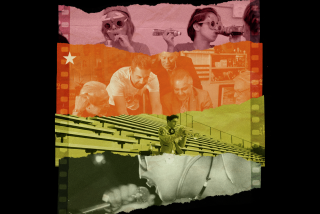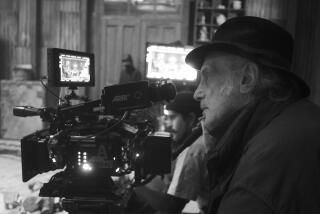‘Crude’ tactics in Ecuador
For director Joe Berlinger, the painstaking road to making the powerful documentary “Crude,” all started with what he dubs his “toxi-tour” of a contaminated swath of Ecuador’s Amazonian rain forest. After massive oil exploration that began in the mid-1960s by Texaco (in a consortium formed with Gulf), the area -- approximately the size of Rhode Island -- is now home to some of the world’s most heinous environmental destruction.
Four years ago, Berlinger traveled to Ecuador to view the destruction at the urging of acquaintance Steven Donziger, a Manhattan-based attorney and consultant to the legal team representing 30,000 native Ecuadorians embroiled, since 1993, in a protracted class-action lawsuit against Texaco and, later, Chevron, which acquired Texaco in 2001. The plaintiffs charge that Texaco spent three decades systematically poisoning their water, air and land, which led to widespread disease and an irrevocable breakdown of these indigenous peoples’ traditional ways of life. (Though state oil company Petroecuador took over complete ownership of the consortium oil fields from Texaco in 1992, it is not involved in this now-$27-billion lawsuit, a verdict on which is reportedly expected in early 2010.)
Berlinger’s initially “reluctant” trip to the Amazon was, to say the least, an eye-opener for the director of such acclaimed documentaries as “Brother’s Keeper” and “Metallica: Some Kind of Monster.” Recalled the New York-based filmmaker in a recent phone interview, “I was absolutely dumbfounded; the pollution there was just unbelievable. There was literally no fresh drinking water.” He added, “While Texaco was operating, they just dumped waste into the rivers and streams that’s home to five indigenous tribes. The lack of moral responsibility just blew me away.”
Though, at first, Berlinger was unsure his usual aesthetic criteria for undertaking a documentary (“unfolding action, a present-tense story, juicy characters”) would be met here, something he witnessed on his second day in the region changed his mind. “I came upon a group of Cofan villagers preparing a meal near the river, and I noticed they were using this big, industrial-sized can of tuna fish. I found out it was because their local fish are either very diseased or dead. That image, more than anything else, made me realize I had to answer the call and point a camera at this and figure out how to make a film to help these people.”
Berlinger, who considers himself “a filmmaker first, a social activist second,” didn’t initially know exactly what kind of film he was making or if it would be a feature at all. It was also the first time since he co-directed 1992’s “Brother’s Keeper,” with frequent collaborator Bruce Sinofsky, that Berlinger started working on a picture without outside funding or distribution in place.
Nonetheless, the filmmaker, who was “shocked” by the dearth of media play for what was happening there, pushed forward until, on his second trip to Ecuador, he met Amazon-born Pablo Fajardo, the charismatic, if unlikely, lead attorney for the plaintiffs, whose law school education was sponsored by the Roman Catholic Church.
“Pablo’s this very simple, humble man, from these humble beginnings,” Berlinger explained. “He went from being an impoverished oil field worker to the lead lawyer taking on, as his first case, the fifth-largest company in the world. All of a sudden, I said, ‘Wow, I have a central character. I have a hero!’ ”
Around this same time, judicial inspections of the oil-related rain forest damage were being scheduled to begin after a nine-year delay, so Berlinger found the “present-tense structure” that had been eluding him. The director started shooting this evidentiary phase of the trial, which took place not in a courtroom but, more dramatically, in the jungle. “At this point, I felt, ‘OK, now I can make a film,’ ” said Berlinger, who also co-wrote and directed the “Blair Witch Project” sequel “Book of Shadows: Blair Witch 2.”
But shooting the ambitious “Crude,” which occurred over the course of three years and 25 trips to Ecuador (and netted more than 600 hours of footage), was rife with obstacles, including sweltering equatorial heat, rampant health concerns and the insurgent violence that plagues the Ecuador-Colombia border. Contended Berlinger, “It was without a doubt the hardest production situation I’ve encountered.”
The project received a significant spotlight in May 2007 when Vanity Fair published a lengthy piece about the landmark lawsuit against Chevron, a case that became known as the “Amazon Chernobyl.” The article inspired producer-environmental activist Trudie Styler to travel to the Ecuadorian Amazon to survey the pollution firsthand and to meet with the poverty-stricken locals, an alarming number of whom have skin disorders, respiratory illnesses and cancer.
The result: Styler and musician husband Sting’s nonprofit Rainforest Foundation, in association with UNICEF, developed a pilot program in which a special water collection and filtration system was devised to provide clean drinking water to those living in the region’s most contaminated areas.
“I have very deep admiration for Sting and Trudie,” said Berlinger, who concedes that “Crude,” which was set to open in L.A. on Friday, takes a “left turn” to dwell a bit on Styler and Sting after it documents Styler’s challenging visit to Ecuador. The filmmaker noted, “I thought it was very important from a ‘message’ standpoint that we see that some tangible good can be had from that kind of uncomfortable but necessary intersection of celebrity culture and social activism.”
And what’s Berlinger’s personal take on this complex, David-and-Goliath court case? “I believe in the theory of the lawsuit that the people who set up this system, which is an inherently polluting system of oil production, are the ones who are responsible,” answered the director. “But [as a filmmaker], I’m trying to make people aware that when you fill your tank with cheap and abundant gasoline in this country, other people in another part of the globe are paying a price for it.”
--
More to Read
Only good movies
Get the Indie Focus newsletter, Mark Olsen's weekly guide to the world of cinema.
You may occasionally receive promotional content from the Los Angeles Times.










